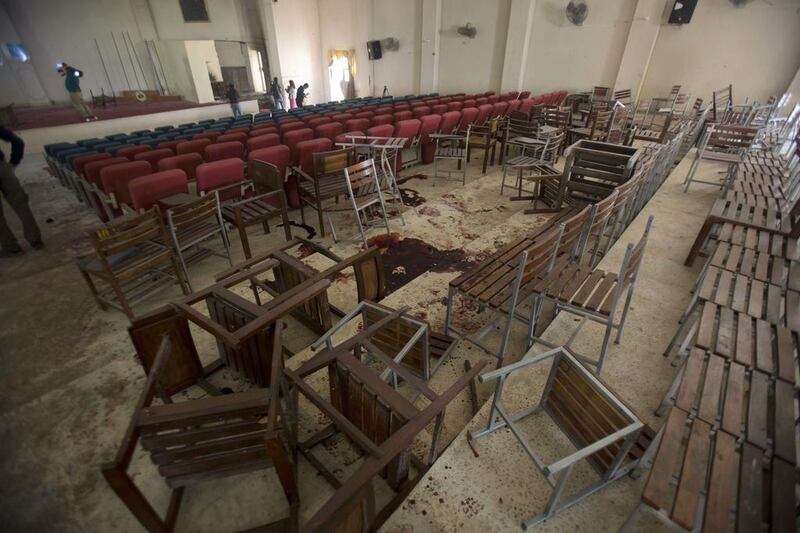Donald Trump has delivered an entirely predictable ultimatum to Pakistan to stamp out the terrorist safe havens on its soil used to plan and mount attacks in Afghanistan and India.
It is the first time since assuming the presidency that Mr Trump has made a foreign policy announcement on live television. His speech was designed to cast him as a decisive global leader, both to the American electorate and the world at large.
“We can no longer be silent about Pakistan’s safe havens for terrorists, the Taliban and other groups that pose a threat to the region,” he said in the speech. “But that will have to change and that will change immediately. No partnership can survive a country’s harbouring of militants and terrorists who target US service members in Afghanistan.”
Considering his mercurial nature, Mr Trump's words represent the most serious US threat to Pakistan since the George W Bush administration delivered a "with us or against us" ultimatum after the Al Qaeda terrorist attacks on September 11, 2001.
The situation now, of course, is markedly different from 16 years ago. Four US navy aircraft carrier groups are not positioned off Pakistan’s coast to enforce Mr Trump’s ultimatum. Nor would several thousand extra troops and a proactive military campaign transform the Afghan conflict.
READ MORE Washington's stance on Pakistan will be key to the future of Afghanistan
More worrisome to Pakistan is the prospect of undefined punitive measures if it fails to sate the US president’s craving for a maiden overseas military victory.
Mr Trump has delegated decision-making authority to his generals at a time when most players in the Pentagon and at the Central Intelligence Agency, including those on the White House National Security Council, want to exact revenge from Pakistan for the dramatic territorial advances made by the Taliban over the past two years.
Drone strikes on terrorist safe havens in Pakistan's western hinterland, beyond the confines of its terrorism-ravaged tribal areas, are a distinct possibility. Surveillance flights were quietly resumed in early 2016, leading to the assassinations of Taliban chief Mullah Akhtar Mansour in Balochistan province last year and senior Haqqani Network commander Abu Bakr in Khyber Pakhtunkhwa province two months ago.
Of even greater concern to Pakistan is Mr Trump’s call for India to play a bigger economic role in Afghanistan, in itself the single largest motivation for Islamabad’s reluctance to abandon its barely covert support for the Taliban against an understandably hostile government in Kabul.
By positioning the Afghan war as part of the wider geopolitical competition in the Indo-Pacific region, at a time when China and India are locked in a Himalayan standoff, and cross border skirmishes between Indian and Pakistani forces in Kashmir are at their most intense since 2001, Mr Trump has further raised the stakes for Pakistan and its closest ally.
He has also raised the ghost of Pakistani nuclear weapons falling into terrorist hands and being used against the US, despite his own government's recognition that the command and control structure established over the last 10 years - in part, with American technical advice - has made that virtually impossible. In doing so, Mr Trump has broadened the US' discrimination between an "illicit" Pakistani arsenal and a "legal" Indian one that targets both China and Pakistan.
As such, the US president's assertion that "Pakistan has much to gain from partnering our effort in Afghanistan [and that it] has much to lose from continuing to harbour criminals and terrorists" sounds all the more disingenuous.
MORE FROM TOM HUSSAIN
[ Political legitimacy will be hard to come by in Pakistan ]
[ Pakistan’s relations with the US are at a generational crossroads ]
[ Despite talks, peace in Afghanistan is as elusive as ever ]
Sadly, aggrieved Pakistanis have nobody but their own army to blame for placing them in Mr Trump’s crosshairs. By relentlessly dictating duplicitous foreign and security policies to the country’s hapless elected politicians, and casting them as national security threats when they have attempted to improve relations with Pakistan’s neighbours, it has ensured that the buck would eventually stop at its doorstep in Rawalpindi.
Equally, Pakistan's so-called deep state is guilty of betraying its own people's trust by not living up to its "no good or bad Taliban" vow after the massacre of some 150 students and staffers at the Army Public School in Peshawar in December 2014.
Many Pakistanis have been deeply distressed by political accommodations made with terrorist groups such as Ahle Sunnat Wal Jama'at, a notorious promoter of sectarian violence, and Jama'at-ud-Da'wah, perpetrator of the murderous three-day rampage through Mumbai in November 2008.
Instead of being punished, they have been allowed them to contest elections, ostensibly in the name of deradicalisation, further undermining Pakistan's skin-deep democratic dispensation after the recent judicial removal of its three-time prime minister Nawaz Sharif.
Like their compatriots in the tribal areas, who have recently been denied the opportunity to join the country’s political mainstream as equal citizens, Pakistanis may soon conclude that they, too, are caught between “the army on one side, the Taliban on the other and drones overhead”.
Tom Hussain is a journalist in Islamabad
Follow The National's Opinion section on Twitter





